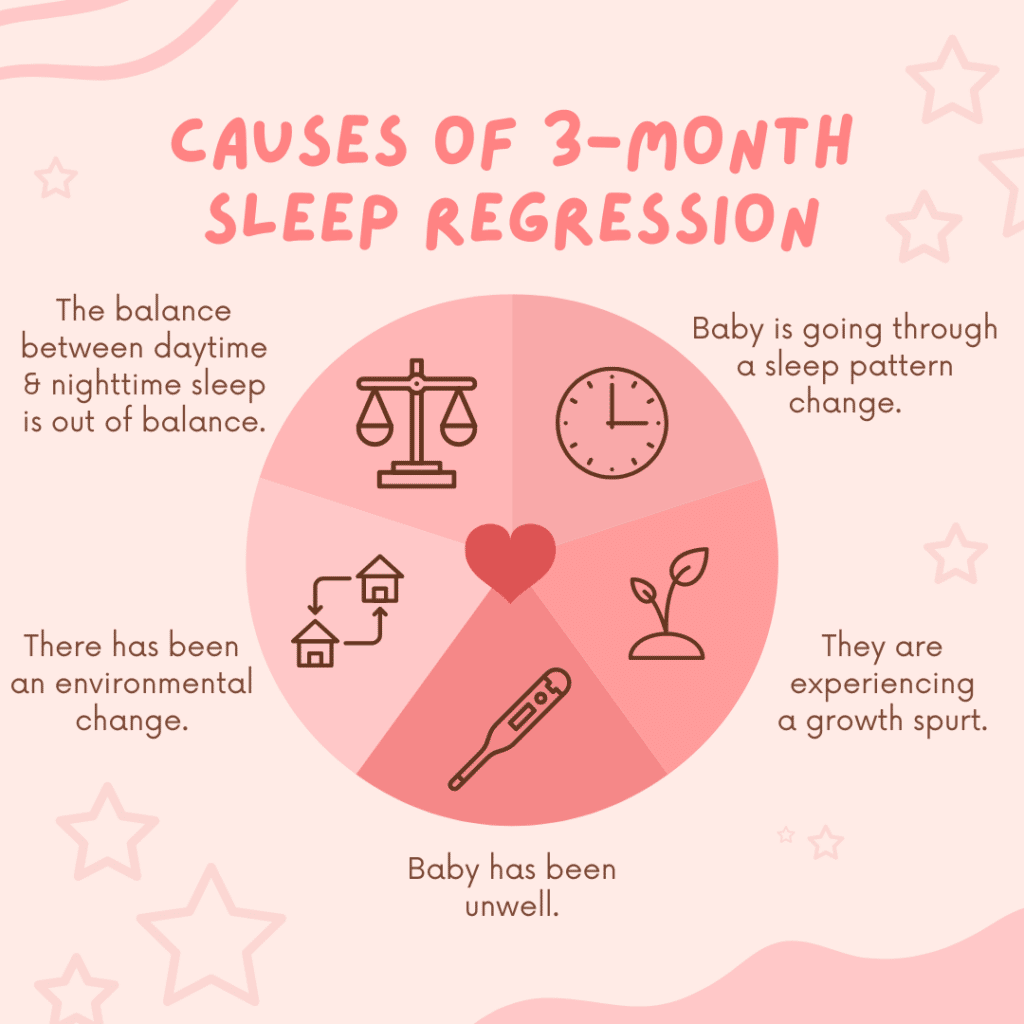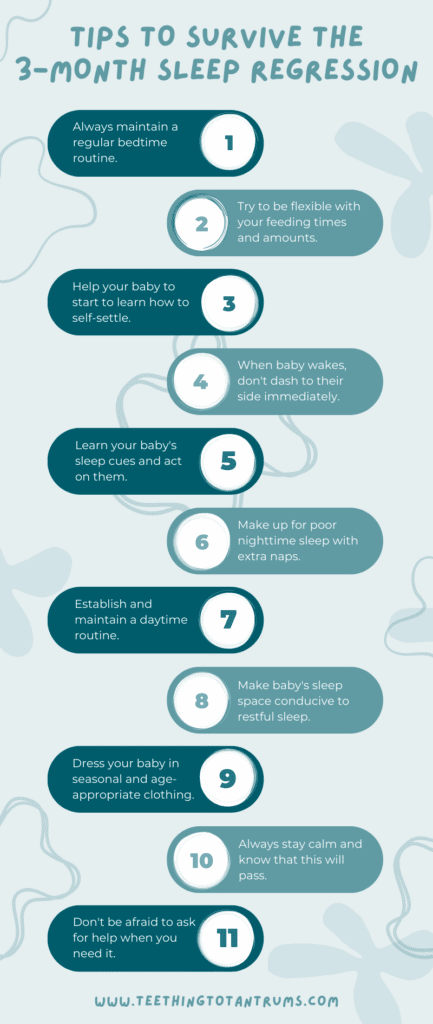Baby suddenly fighting sleep? Being fussy? Struggling to settle? The 3 month sleep regression has arrived. Here’s what that means, and what exhausted parents need to know to get through it.
What Is The 3 Month Sleep Regression?
The 3 month sleep regression is a period of time in which your baby’s sleep pattern becomes disrupted by them fighting sleep, waking more often and struggling to fall back to sleep.
Is The 3 Month Sleep Regression Real?
Yes, the 3 month sleep regression is real.
The first sleep regression usually happens around 3 to 4 months of age and is the most difficult to handle for many parents as you may feel like you have just got your little one’s 3 month old sleep schedule sorted after weeks of sleepless nights…
For it all to go wrong with more nighttime waking and your baby resisting sleep.
REMEMBER: Although there are ages at which sleep regressions are more likely to occur they can in fact happen at any age.
How Long Does The 3 Month Sleep Regression Last?
The 3 month sleep regression, like all sleep regressions, commonly lasts between 2 and 6 weeks depending on the trigger.
What Causes A 3 Month Sleep Regression?
The first sleep regression that occurs between 3 and 4 months is slightly different from regressions that occur when your child is older because it’s more defined in its cause and is usually driven by one of the following reasons:

1. A major change in your baby’s sleep patterns. As your little one moves away from newborn sleep towards a more structured sleep pattern with longer wake periods during the day and less nighttime feeding a huge adjustment needs to take place.
The Sleep Foundation explains that a sleep regression at 3 months occurs because ‘babies are in the midst of a major transition away from a newborn sleep pattern. That transition is not always smooth; it may have plateaus or setbacks.’
As a result, your baby will now spend more time in lighter sleep (also known as non-REM sleep) which causes more frequent waking.
2. They are experiencing a growth spurt. If your little one is going through a growth spurt it may disrupt their natural and established schedule for a short time as they are using more energy to grow or are becoming restless.
3. Your baby has been ill. Should your little one be unwell this can also disrupt their sleep routine for a while as their normal routine is flipped upside down.
4. There have been environmental changes. Moving house, travelling with your baby or staying over at Granny’s can all trigger a sleep regression.
5. You’re figuring out the balance of daytime and nighttime sleep. Sometimes getting the balance between naps and nighttime sleep wrong can throw off your baby’s sleep pattern and circadian rhythm which can trigger a sleep regression.
A bedtime & nap cheat sheet so good your little one will ask you to put them to bed...
Laura Williams "This is a life saver! I'm so glad I downloaded your bedtime & nap cheat sheet. My little one actually asked me to put him to bed last night! Unbelievable! Thank you so much!"
Click Here For The FREE Cheat Sheet
3 Month Sleep Regression Signs
For some children a 3 month sleep regression is obvious, but for others, there are some subtle signs that indicate your little one is entering a sleep regression stage.
So, here are the signs to look out for:
- Baby has difficulty falling asleep. If your baby has finally started to fall asleep nicely and then starts to regress to resisting sleep and struggling to settle then it is very likely they have hit their first sleep regression.
- Baby is more restless and fussing when waking. Because a sleep regression results in less deep refreshing sleep your little one may wake in a grumpy mood and be rather fussy and unsettled.
- There are more nighttime wakings and naps are shorter. As with finding it more difficult to fall asleep, it is typical during a sleep regression due to the change in their sleep pattern for your baby to wake more often at night. This may also affect how long they stay asleep during the day too.
- Your baby is more alert and interested in their surroundings. As with learning a new skill, developing an interest in their surroundings means your little one’s brain is being very stimulated and may struggle to wind down for sleep.
Tips To Manage The 3 Month Sleep Regression
Navigating a sleep regression is no easy task, but fortunately, there are some tried and tested tips to help you get through the 3 month sleep regression as quickly and easily as possible:

1. Have a regular bedtime. Ensuring your baby gets consistent cues in preparation for sleep will go a long way in helping your little one fall asleep during a sleep regression and a regular bedtime routine will do just that.
2. Be flexible with feeds. It is very tempting to feed your baby in order to get them back to sleep… however, this is not a habit you want to continue. Therefore, if your baby is experiencing a growth spurt (which is very common at 3 months of age) your baby may naturally become more hungry. Try introducing a dream feed before you go to bed to prevent extra nighttime waking and increase the length of time you breastfeed by a couple of minutes or increase bottle feeds by ½ ounce.
3. Help your baby to start to learn to self-settle. Now is a good time to teach your baby to self-settle by putting them down to nap or at bedtime when they are drowsy and not fast asleep. Try to resettle your baby with a touch or your voice rather than picking them up, rocking or feeding them.
4. Don’t dash to their side. Sometimes leaving your little one to fuss for a short time can result in them falling back to sleep without you having to go to them. If they start to become distressed, however, you should go to them.
5. Learn your baby’s sleep cues and act on them. Your baby may need more sleep during the day to make up for broken nights so keep a keen eye on their sleep cues and act on them to avoid overtiredness.
6. Make up for poor nighttime sleep with extra naps during the day. Let your baby sleep whenever they need to during the day to avoid them becoming overtired. Knowing how much sleep your baby needs in a 24-hour period and then calculating how much daytime sleep they need will help enormously too.
7. Establish a routine. As your baby’s circadian rhythm linked to melatonin secretion (which is also provided through breastmilk) starts to settle into a more regular cycle… 3 months is an ideal age to start a more structured nap, play and bedtime routine.
8. Make baby’s sleep space more conducive to sleep. As your baby becomes more alert they will lose the newborn ability to sleep anywhere… So, darken the bedroom using blackout blinds and use a nightlight. Using a white noise machine can eliminate background noise from disturbing your baby’s sleep too.
9. Dress your baby in the correct sleep gear. Many babies of this age will no longer sleep well if swaddled. Moving to a weighted sleeping bag or transitioning out of a swaddle can help with enabling your baby to sleep more peacefully and comfortably.
10. Keep calm and know that this will pass. Sleep regressions can be very distressing and exhausting but remember they are temporary by nature and will pass. The key is to hold onto as much of a routine as you can and adapt to your baby’s temporary sleep disruption.
11. Enlist help. Don’t be afraid to ask for help and share the load of broken nights and dealing with a sometimes grumpy baby in the day.
Frequently Asked Questions About The 3 Month Sleep Regression
Looking for more information about the 3 month sleep regression? Check out the most commonly asked questions here.
How Do You Break A Baby’s 3 Month Sleep Regression?
Sadly, you cannot break a 3 month sleep regression… Following the tips above will help, but ultimately you will simply have to wait for the sleep regression to end.
Does The 3 Month Sleep Regression Affect Naps?
Yes, the 3 month sleep regression will affect naps. This is because if your little one has not had sufficient sleep during the night… they will need extra sleep during the day. You may also find that your baby sleeps for less time during their naps, so they will require more of them.
Do All Babies Experience A 3 Month Sleep Regression?
No, not all babies will experience a 3 month sleep regression.
Why Is My 3 Month Old Waking Up More Often At Night?
Night-time waking is a typical sign of a sleep regression because your 3 month old now experiences lighter non-REM sleep that results in them waking more easily and struggling to re-settle.
Are The 3 Month Sleep Regression And 4 Month Sleep Regression The Same?
Yes. Your baby will not experience a sleep regression at 3 months and then again at 4 months. This first sleep regression, which is the most common, usually occurs any time between 3-4 months of age.
Is There A 3 Month Growth Spurt?
It is very common for babies to experience a growth spurt at 3 months of age and this can trigger fussiness and increased hunger which in turn can disrupt sleep by making your baby wake more often at night, due to hunger or an inability to resettle.
How Many Times A Night Should A 3 Month Old Wake Up?
Nighttime wakings vary hugely from baby to baby. But on average, 3 month old babies will wake 4 times a night.
NOTE: 3-month-old babies can wake up anywhere between 2-6 times a night.
When Do I Need To Talk To A Doctor About The 3 Month Sleep Regression?
If you are unsure if your baby’s change in sleep patterns are due to a sleep regression… watch for the following signs. If they are present then you should consult a doctor.
- Your baby is not gaining weight.
- Your baby is eating less.
- Your baby is having fewer than 4 wet diapers and 3 bowel movements a day.
Need More Parenting Help?
- Download our FREE Bedtime & Nap Sleep Cheat Sheet. It’s a free, easy-to-use and proven formula designed for parents of 0-5 year olds to master the art of consistently undisturbed and restful sleep without the yelling, nagging or exhausting long-winded evenings.
- Check out our Parenting Toolbox. You’ll get access to expertly-chosen products that you can guarantee are the best for your little one and your wallet.
- Are you looking for personalized guidance to navigate the challenges of parenting? I offer 1-on-1 consultations to bring you tailored strategies and actionable advice to help support your child's growth and well-being with confidence.

A bedtime & nap cheat sheet so good your little one will ask you to put them to bed...
Laura Williams "This is a life saver! I'm so glad I downloaded your bedtime & nap cheat sheet. My little one actually asked me to put him to bed last night! Unbelievable! Thank you so much!"
Click Here For The FREE Cheat Sheet


